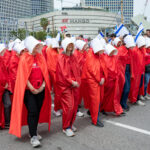Summary: Since the failure of a military coup against him, Turkey’s President Erdogan has launched a coup of his own, clamping down hard on all opposition — Editors
By sunrise next day, it was already clear that the coup had failed. The attempt had only limited support within the armed forces and effectively none in civil society. Erdogan was able to call his supporters onto the streets to oppose the military rebels. Opponents of the president, who had taken part in mass protests against him, had even less liking for a military coup. The opposition parties all issued statements condemning the plot.
Some of the soldiers who surrendered were brutally treated by supporters of the ruling Justice and Development Party (AKP) — stripped, beaten and in some cases killed.
In the aftermath, Erdogan at once set about a sweeping purge, reaching far beyond any who could reasonably be suspected of complicity in the coup; arresting, dismissing or suspending from their jobs thousands of soldiers and officers, judges, university professors, teachers, journalists, staff of Turkish Airlines and others.
Evidently Turkey is now in the grip of a second, presidential, coup, in which Erdogan is amassing ever more power to himself and his party and clamping down hard on all opposition. He has declared a three month state of emergency giving himself power to make laws, and threatened to reintroduce the death penalty.
The political orientation and intentions of those who launched the coup remain obscure. According to Erdogan, it was instigated by Fetullah Gulen, a Muslim cleric resident in Pennsylvania. Gulen heads a religious community or movement which has allegedly been infiltrating Turkish institutions, including the army and police, for years. Before 2013, Erdogan’s AKP and the Gulenists were allies, but then they came into conflict over accusations of corruption. Historically, the military has been strongly attached to Kemalism — the ideology of secular nationalism handed down from Mustafa Kemal (1881 — 1938), the first president of the Turkish Republic, who took the patriarchal surname Ataturk (Father of the Turks). Although the grip of the Kemalists in the armed forces has been weakened by purges already carried out by Erdogan, it seems doubtful whether the Gulenists had sufficient support to organise a coup, or whether they could do so without Erdogan’s security service finding out. It has been suggested that the coup may have been hastily conceived to head off another purge of the armed forces.
Although the AKP is often described as Islamist, it seems that Erdogan’s relation to Sunni Islam is somewhat like Putin’s to Russian Orthodox Christianity: religion is one attribute of the leader’s particular construction of national identity. Initially the AKP appeared as a capitalist democratic party (comparable perhaps to Christian Democracy in Europe), no small thing in a country with a long, tragic history of military coups. Over time, Erdogan has shifted towards a more authoritarian, approaching dictatorial, style of government (like Vladimir Putin in Russia).
One element of Erdogan’s new Turkish ideology is neo-Ottomanism, taking the Ottoman Empire as inspiration for building up Turkey as a powerful modern state, while replacing the cult of Ataturk.
In the long war between the Turkish state and the Kurdish independence movement, Erdogan agreed a ceasefire and opened peace talks — which he then abandoned, launching a murderous new military offensive against the Kurds and in effect assisting the so-called Islamic State.
Turkey’s international as well as domestic politics are now in flux. Erdogan has strained relations with the U.S., and the prospect of accession to the E.U., already dwindling before the coup, has all but vanished now. Now there seems to be a rapprochement with Russia (despite the recent crisis when Turkey shot down a Russian warplane), and a turn towards Israel. This all adds to the general shake-up of alliances in this period of global turbulence. Where this will all lead is unpredictable.
A promising new force on the left of Turkish politics is the People’s Democracy Party (HDP). It is a multi-ethnic party uniting Turks, Kurds and other ethnicities. It is strongly feminist and supportive of LGBTI rights. In elections in 2015 it won 13.1 percent of the vote (as against 40.9 for the AKP). These are difficult and dangerous times for the Turkish left, amid the “second coup” that Erdogan has launched.
LEAVE A REPLY
1 Comment
LEAVE A REPLY
1 Comment
-
kia saidi on August 7, 2016 at 9:38 pm
I see this counter-coup, which is itself a coup against the people, and the weak so-called democracy in Turkey, as another step toward centralization of power in the hands of Erdogan to crack down against a rising opposition of the left and progressive forces of revolution and freedom. It is just like Trump in US and far right in UK and other countries and is occurring because of the crisis within the capitalist system.







I see this counter-coup, which is itself a coup against the people, and the weak so-called democracy in Turkey, as another step toward centralization of power in the hands of Erdogan to crack down against a rising opposition of the left and progressive forces of revolution and freedom. It is just like Trump in US and far right in UK and other countries and is occurring because of the crisis within the capitalist system.